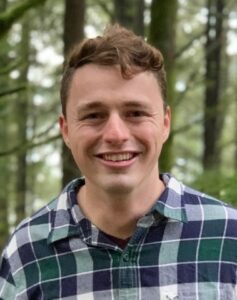
While studying at the Ford School, Geoff Gamm (BA’ 18) focused on health care policy, and planned to continue his studies in public health after graduation. Looking for a break from academia, he went to work as a project manager at Epic, an electronic medical records company at the intersection of health care and technology.
“I wanted to do something in health care with organizations that are innovators in the industry,” Gamm said. “Electronic medical records are the invisible central nervous system of all health systems today. They are the screens that physicians use during your appointments, the patient portal that sends Michigan students regular health screening reminders, even the data that helped clinicians identify and respond to the cause of the Flint water crisis. I became excited by the quiet power of technology to be an instrument that both delivers and creates health policy.”
After three years, he began his current position with a startup called findhelp, a network that connects millions of people in need to social programs that serve them, with dignity and ease. Gamm notes that anyone can visit their website, findhelp.org, and instantly find vetted housing support, food pantries, financial assistance, and other free or reduced-cost services. It has become the largest social care database and referral system in the United States, Gamm says.
“Findhelp is cutting edge in terms of being a different way that we think about the democratization of social care through technology. Most people will need a helping hand at some point in life. We have a responsibility, as a society, to make the process of getting help as easy as possible while also maintaining that person’s dignity and privacy.”
In his role as customer success team lead and government relations liaison, Gamm and his team partner with health systems, health plans, government agencies, employers, schools, and nonprofits to develop a “no wrong door” technology solution that helps people navigate social services. For example, Gamm worked with the Institute for Family Health, a Federally Qualified Health Center (FQHC) in New York City, to address patient transportation barriers by coordinating thousands of free Uber rides to COVID-19 vaccination appointments. He also worked with first responders in New Jersey to use findhelp as an app that helps them connect at-risk residents with social care resources, like addiction support services or housing shelters.
“We are shaping social care policy from the ground up,” Gamm said. “When applied responsibly, technology can lead to empowerment for individuals, governments, and everyone in between.”
He advises Ford School students and alumni to keep their minds open and view the opportunities presented by public policy with a broad lens.
“My perception of public policy before college was limited to government, but since then, I’ve experienced the larger ecosystem of community stakeholders, policy makers, and information technology systems that shape policy. Don’t limit yourself in the places you could go or the things you can do with the critical thinking and analytic skills you get from the Ford School. Your education here opens many doors and your passion will guide you to the right one. Walk through it confidently with sincerity, humor, and kindness.”


